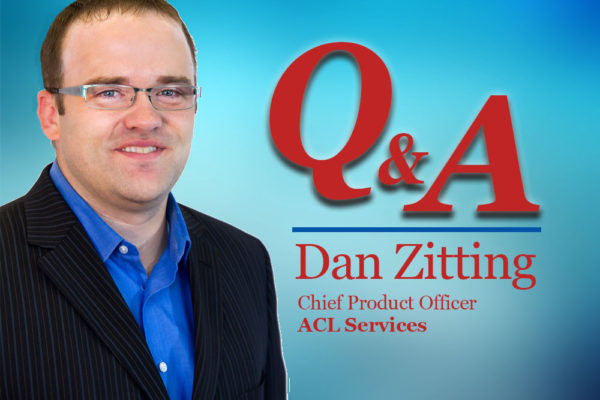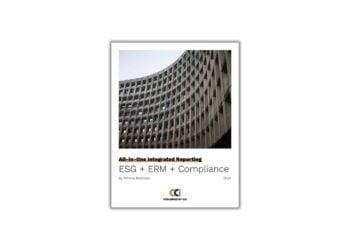Q&A with Dan Zitting, Chief Product Officer at ACL
Today we are pleased to publish a recent interview between Corporate Compliance Insights’ CEO, Maurice Gilbert, and Dan Zitting, Chief Product Officer at ACL Services. Dan has been gracious to share with us his thoughts on fraud issues and what the GRC community can do to fight fraud more effectively.
Maurice Gilbert: How did you launch your career in compliance and anti-fraud technology?
Dan Zitting: Somehow, I woke up one day and realized I was an auditor. I don’t think anyone becomes an auditor on purpose, but I love where it led me. I was in college during the dot-com boom, so focusing on tech was the sexy thing to do. Of course, the bubble burst before I graduated, so I just needed to find a job. I took what I thought was a hot consulting gig in the IT Risk Advisory practice at Ernst & Young, but it really meant I was an IT auditor. I quickly learned to love it, however, and became particularly interested with how technology could really add value to the profession, and how it was a differentiator for someone who could use tech to assess risk and combat fraud.
After four years with E&Y, a business partner and I started our own firm. I ultimately developed a proprietary SaaS audit platform and started my own software company, Workpapers.com. The product became very popular and we began to grow. I eventually sold the company to ACL and have now been here for almost five years.
MG: Who helped shape your views?
DZ: My first boss was my father. He owned a hardware store and grew the business over 40 years, despite increasing competition from the likes of Home Depot and Wal-Mart. His business plan was simple: overspend on your customers and manage risks carefully. He would spend almost all of his time during the day on the floor with customers, which gave me a real appreciation for what makes any business succeed. Customer intensity is one of ACL’s core values, and I really learned that from watching my dad. It also really bothered me when people or employees would steal or cheat the store, as my family’s livelihood depended on it – I remember people clocking fake overtime as the most infuriating. In some cheesy way, it almost feels like I was meant to work on solving that problem eventually.
MG: How do you stay current on fraud and compliance issues?
DZ: I’m lucky to benefit from the ecosystem of over 14,000 ACL customers that helps me keep up with the most pressing fraud and compliance issues. I work directly with many of our largest customers to build technology solutions for them, as well as interact with thousands of others through our peer community forum. I also speak at many industry conferences, thus benefiting from both the audience and sessions of others and of course I read as much as I can from great publications and blogs like CCI.
MG: What are some of the significant fraud-related issues facing CCOs, Risk Managers, etc.?
DZ: According to industry research, fraud claims up to 10 percent of corporate revenues, regardless of company size. Not only is there a great need to prevent those costs, but C-suite executives and managers are facing industry and government regulators taking more direct aim at individuals by holding them personally responsible for fraud that takes place on their watch. The most critical fraud-related issues to me, though, are those that impact society much more broadly. Money-laundering-related fraud in financial institutions enables the operations of terrorists and criminals; bribery and corruption schemes create an unfair playing field for organizations and impact economic security; credit and identity fraud can ruin the lives of families. I think it is our role as CCOs, Risk Managers, etc. to protect society through our professional practice.
MG: How might CCOs, CAOs and CROs prepare to overcome these obstacles?
DZ: These types of executives have the opportunity to tackle fraud from both ends – prevention and detection – but tend to focus mainly on the former. While key preventative measures are not to be avoided, organizations are currently spending nearly 80 percent of their resources trying to prevent what is often unpreventable. Whether looking at cybersecurity, fraud, compliance violations or other similar types of risk issues, we tend to add policies, processes, firewalls, legal terms, etc. that build up over time and add massive overhead and inefficiencies to the business. Yet we all know it is impossible to gain 100 percent confidence that security breaches and fraud won’t occur. By focusing an equal or greater effort on building the ability to detect anomalous events and behavior early, executives can develop an organizational capability to stop risk events without imposing undue overhead.
MG: Why is it important to focus on detection?
DZ: A good example is considering credit card fraud detection and travel. If an executive’s corporate credit card were blocked every time he or she left town, it would be very difficult to accomplish anything when traveling for business. So instead, continuous monitoring and data analytics allow credit card companies to detect and flag only unusual locations or anomalous expenses and then reach out to the individual to ensure the spend is justified. Fast detection stops fraud while maintaining a great customer experience where strict prevention would impose painful burdens.
MG: How else should CCOs be thinking differently about fraud?
DZ: It is my personal belief that the ability to use data and analytics effectively is the most critical organizational capability in the fight against fraud. For instance, many organizations are under the delusion that controls enforced in ERP systems are an effective fraud-fighting solution. In reality, large, multi-dimensional ERP systems are very complex to configure and maintain and frankly create as many opportunities for fraud as they prevent.
For example, I recently worked with an organization that thought their ERP system was able to block employees from both creating a vendor and cutting a check to that same vendor. In fact, while it did work when someone entered new vendors in the system one at a time in the user interface, the same control wasn’t applied when vendors were uploaded in bulk. Sure enough, an opportunity for fraud had been both created and exercised. Data analytics, however, are done at the level of the transactional data itself and will easily identify a situation like this simple example.
MG: How do you effect change in your clients’ fraud and risk management programs?
DZ: The first step is to ensure our clients really understand and accept that they are at risk of fraud. We then work with them to recognize the gaps in their existing systems (ERP, preventative measures, etc.) and determine the right solutions to fill those gaps. The secret sauce is enabling them to build a program centered on developing a capability for high-impact data analysis.
MG: Compliance departments are often asked to accomplish their work with limited resources. Do you see this situation changing any time soon?
DZ: Yes, and no. There are two primary resources available to a fully functioning compliance department: people and technology. If both of those resources are functioning at high capacity, then the quantity of resources is not a limitation. However, if a department is either lacking high-quality people or the most advanced technology, then it will struggle.
 Dan Zitting is Chief Product Officer at ACL, where he leads the group focused on partnering with customers to evolve ACL’s solutions and then go to market, including the product management, product design, content solutions, user experience and marketing teams. During Dan’s time at ACL, the organization has won multiple prestigious awards and industry analyst recognition for product innovation, value delivery and talent development.
Dan Zitting is Chief Product Officer at ACL, where he leads the group focused on partnering with customers to evolve ACL’s solutions and then go to market, including the product management, product design, content solutions, user experience and marketing teams. During Dan’s time at ACL, the organization has won multiple prestigious awards and industry analyst recognition for product innovation, value delivery and talent development.
Prior to joining the C-suite, Dan was VP of Product Design and Management, responsible for product management, design and user experience for ACL’s industry-leading software products.
Dan’s previous experience has been in the audit, risk and assurance industry. After working for several years at Ernst & Young, he co-founded the CPA firm Linford & Company LLP, which provides audit services to global clientele. While running his own practice, he developed web-based software for auditors to meet his team’s needs. As demand for this software increased, he founded Workpapers.com, which was acquired by ACL in 2011.
Dan is dedicated to the advancement of productivity-enhancing technology for the audit profession and is a three-time winner of the CPA Practice Advisor Magazine’s 40 under 40 and Readers’ Choice awards.
Dan is a Certified Public Accountant, Certified Information System Auditor and Certified Information Technology Professional. He holds a Bachelor of Science degree from Colorado State University and a Master of Science degree from the University of Notre Dame.











